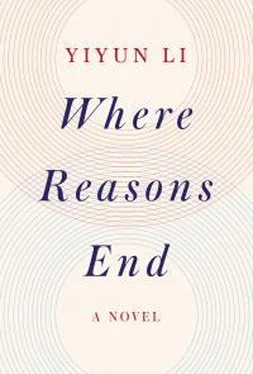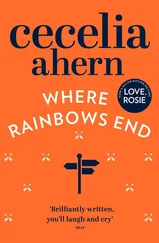That’s nice, he said.
I couldn’t tell if he was annoyed or bored or sad or angry. Tones were what we were missing now, and without tones words were floating, gravity-less, missing one another or, worse, clashing without a warning.
I wish I could show you the house, I said. I was treading dangerous water, but wasn’t that what a mother should be doing, dreading the worst and hoping things would turn out better?
I have seen the house, he said.
With someone else’s furniture staging someone else’s life, I thought. Yet I shouldn’t have had that thought. Nikolai had not relied on other people’s furniture as placeholders. He had made plans for the kitchen and the garden and his bedroom.
Wouldn’t it be nice if you lived in the house with us, too? I said, so softly that it was almost only a passing thought.
It doesn’t matter, he said.
Why not?
It’s still our house.
Ours, yes, but it was also a house of chutes and ladders, with empty walls and yet unpacked boxes making up the grids. Each box I opened let out memory that no space could contain. Each box that remained sealed retained its power to trip and trap. To throw or not to throw the dice: It makes little difference. In a game of luck, luck is already determined.
Since when have you become an avid consumer of inane analogies and inept metaphors? Nikolai said.
The adjectives you indulge yourself with, I complained.
At least I’m consistent. I’ve never said anything negative about adjectives. But you, you’ve been dismissive of analogies and metaphors.
I’ve started to understand the point of them, I said. They take up space, they distract, they make the difficult less difficult, they even fluff things up a little. And they can be a shortcut, too, the ladders, you know.
You’re becoming a bad writer.
Does it matter? I said. I want a game with more ladders than chutes.
If you’re protesting by becoming a bad writer, I would say it’s highly unnecessary.
Dying is highly unnecessary too, I said.
Oh, people always die, sooner or later.
Always, ever, never, forever—had he lived to my age, would he have abolished these words, too?
There are plenty of bad writers, I said. What’s so terrible about being one of them?
You sound like a child throwing a tantrum, he said. I don’t get a chocolate. Why am I not getting a chocolate? It’s so unfair I don’t know how to button my coat anymore. It’s so unfair I have to put my left shoe on my right foot and my right shoe on my left foot. And I have to stamp my feet until my toes hurt. And I have to punch the wall until my knuckles are bruised. And I have to shut my eyes so I will stumble and fall.
When I was a child, it was grownups who had the liberty to throw a tantrum, but this I did not tell Nikolai.
Still you don’t get the chocolate, he said. Oh, poor, poor you.
You are not a mere piece of chocolate, I protested.
Why can’t I be as daft as you and toss around metaphors and analogies?
By all means, please do, I said.
Then what? he asked.
I gave up. I was slow when we argued.
Then we become catchers in the rain.
Cold, wet, soles of our shoes slippery, our fingers numb, what could we catch? Any seasoned parent was an expert at catching: toppling babies, somersaulting spoons, half-eaten bananas and apples, half-ripe blood berries. Everything breakable and unbreakable belonged to a parent’s field, but what could I catch on this gray, wet morning? Not the smile on your face, not the light in your eyes, not a blue cat, not a purple penguin, not dust in the wind, not a thought whispering in your ears, so loud that it had drowned out all the music of the world. What, my child, can I catch now, when all has become invisible?
Words, mother dear, Nikolai said. We will be catching each other’s words, don’t you see?
6
What a Fine Autumn
How are you today? I said. It was an inane question but I was too sad to look for a better opening.
Why don’t people start a conversation by saying, Who are you today? Nikolai said. How anyone is matters less than who he is, don’t you think?
Who are you, I said. It sounds intrusive, does it not?
How are you—is it less intrusive? If someone does want to know the answer it’s intrusive too.
Who are you? I went over the question in my head. I suppose people would have a harder time saying who they are, truly, I said. Or there are so many possibilities it’s hard to give one and neglect the other twenty.
When you see a tree, do you say, How are you today? Mediocre, the tree may think, because it’s a windy day. But it’s obliged to reply, I’m good, thank you, and you? No, when you see a tree you think, Here is a tree.
People are more complex than trees, I said.
We think we are, he said. So, who are you today?
I’m your mother.
See, you don’t have a problem answering it right away.
But I wouldn’t give the same reply if someone else asked me, I thought.
What if someone else did ask, Nikolai said. Say you go to a coffee shop and the guy at the counter says, Who are you?
I would say—I’m nobody.
How very imaginative.
But that’s the problem, I said. Who are you is a question already asked and answered for us by a poet.
Dare we not make up a new and better answer?
Who are you? I said.
I’m somebody, he said, like nobody’s business.
And nobody’s fool, I said.
I’m somebody who’s nobody’s fault.
I wondered what the difference was between somebody and nobody. Any person with a solid physical form could not avoid having some body, which would make the statement I’m nobody a misclaimer.
Misclaimer for everyone but me. I can certainly claim that disclaimer. I’m nobody, he said. But I won’t.
It was seven weeks since Nikolai had died. In Buddhist tradition, a soul leaves this world for the next after forty-nine days. I did not believe in this or the other world, the soulful or the soulless, the forty-nine-day gap where the departed retained their senses with an intensity that no living body could achieve. Still, what if he would not be here tomorrow? What if when I speak tomorrow, nobody replies?
That’s silly, he said. Whether I’m here or anywhere is not decided by some tradition you don’t even believe in.
Fear doesn’t speak reason or logic, I said.
Phobia is irrational, he said. You can be reasonable and logical in your fears.
I counted my fears. Perhaps I should make a list of them and write the ways to be reasonable and logical next to each one.
What are days for me in any case? he said. Have you thought it may very well now be today and today and today and today?
I had thought about that. That, too, was my fear. Would one, plucked out of a timeline of yesterday and today and tomorrow, become a fish out of water?
A fish out of water, Nikolai said. Really, Mommy, the clichés you use these days, and not even to the point.
I would rather, I thought, have all the clichés in the world to make a tepid pond for myself.
So you could swim around like a sluggish koi fish? he said.
I protested at his unkind imagination.
A fish has only three seconds of memory, he said.
So you told me many times, I said.
Now that’s called living in the moment.
I shuddered.
I know, he said. People say that all the time: You should live in the moment. Why, I used to want to ask, to live like a koi fish?
I must have been among the people who had said that to him, I thought.
Yes, you are, and I bet you ten dollars you don’t even understand it yourself.
Five dollars? I asked. We used to bet on many things. Nikolai had collected a stack of IOUs from me.
Seven?
Читать дальше












